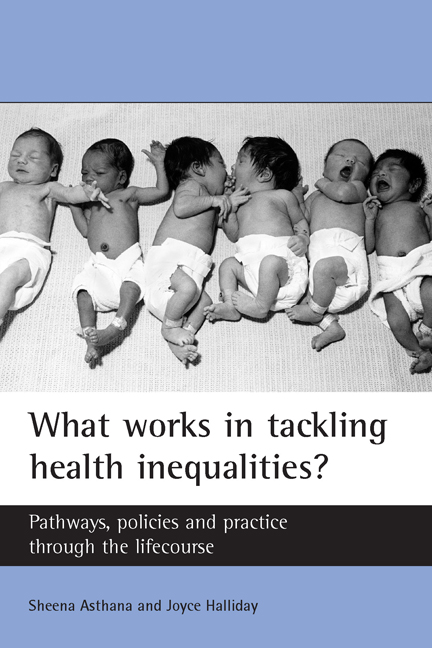Book contents
- Frontmatter
- Dedication
- Contents
- List of tables, boxes and figure
- Acknowledgements
- List of abbreviations
- one Introduction
- Part 1 The research and policy context of health inequalities
- Part 2 Health inequalities pathways, policies and practice through the lifecourse
- Part 3 Tackling health inequalities: developing an evidence base for public health
- Index
ten - Health inequalities during adulthood: research evidence
Published online by Cambridge University Press: 14 January 2022
- Frontmatter
- Dedication
- Contents
- List of tables, boxes and figure
- Acknowledgements
- List of abbreviations
- one Introduction
- Part 1 The research and policy context of health inequalities
- Part 2 Health inequalities pathways, policies and practice through the lifecourse
- Part 3 Tackling health inequalities: developing an evidence base for public health
- Index
Summary
Introduction
The development of lifecourse approaches to health inequalities has not only addressed the neglect of early life influences in a literature previously dominated by a concentration on adult risk factors for chronic adulthood disease (Davey Smith, 2003). It has also begun to challenge existing research on the relative contribution of such risk factors. For most of the postwar period, research focused on the role of so-called lifestyle factors in determining risk for chronic disease. The individualistic and potentially victim-blaming nature of such research attracted considerable criticism, which may go some way towards explaining why the psychosocial hypothesis (which explicitly considers the role of social inequality in producing ill health) was so warmly received. Indeed, psychosocial interpretations of the effects of social inequality on population health were accepted as common wisdom by the late 1990s.
More recent research has begun to question the relative significance of this pathway. For example, recent empirical data do not support the notion that current markers of social capital and the psychosocial environment account for health differences between countries. Early life circumstances 70 years before may be as, if not more, significant. This is certainly suggested by the type of evidence presented in Chapters Four and Six, which shows that socio-economic and psychosocial conditions during early childhood have a powerful impact on health, behaviour and achievement across the lifecycle.
While there is considerable current research interest in the relationship between childhood disadvantage and adult health, this should not result in the pendulum swinging away from a concern with adult risk factors to an excess concentration on early life influences. First, as we proposed in Chapter Two, the jury is still out on the psychosocial hypothesis and, at an individual level at least, there is strong evidence of a causal association between social support, mental health and physical health. Second, lifecourse research suggests that both childhood and adult circumstances influence health variations (Kuh et al, 2003). We examine such research in the first part of this chapter and describe the complex picture that emerges of the determinants of social inequalities in adult mortality. For example, evidence suggests that the relative importance of early and later life determinants of mortality varies according to cause of death. The differential effects of childhood and adult exposures may also change over time.
- Type
- Chapter
- Information
- What Works in Tackling Health Inequalities?Pathways, Policies and Practice through the Lifecourse, pp. 373 - 416Publisher: Bristol University PressPrint publication year: 2006



